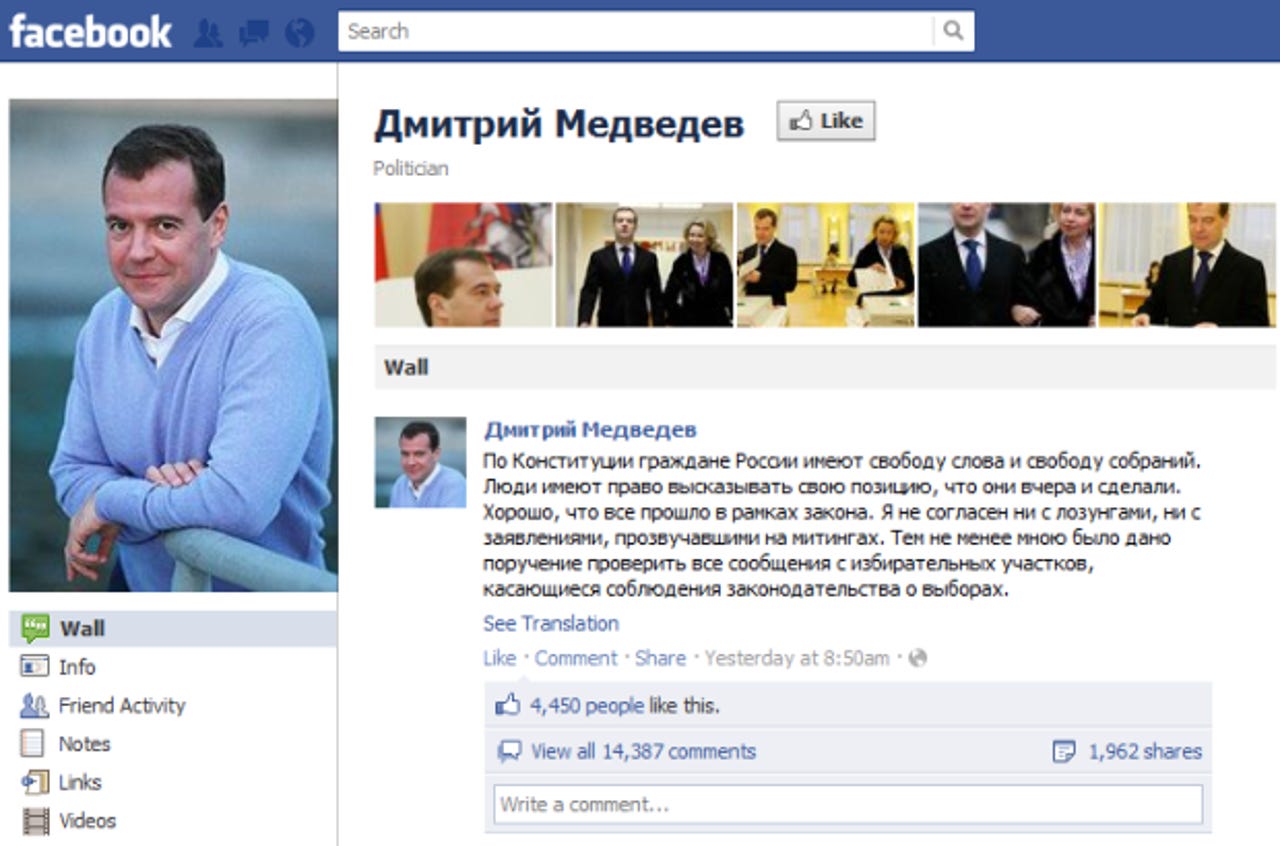Russian president uses Facebook to answer protesters

On Sunday, Russian President Dmitry Medvedev posted on his Facebook Page that he had ordered an investigation into claims that the December 4 election, won by Prime Minister Vladimir Putin's ruling party, was part of an election fraud. Although it was thoughtful on his part to choose Facebook as his medium of communication, given that Russians have embraced the social network as a tool to organize protests with, the content of his post was not so tactful.
As you can see in the screenshot above, Medvedev wrote his post in Russian, but here is a rough English translation: "Under the Constitution, Russian citizens have the right to freedom of speech and freedom of assembly. People have a right to express their position, which they did yesterday. I do not agree with the slogans nor the statements made at the rallies. Nevertheless, I have given instructions to check all information from polling stations regarding compliance with electoral legislation."
He was quickly denounced and was repeatedly insulted by thousands of Russian Facebook users. There were a few positive replies and some neutral ones, but the overall consensus was very critical. At the time of writing, his post had already amassed some 15,000 comments.
This is notable not only because of the raw number but because of the open defiance of the Facebook users: in Russia, political activists are jailed on a frequent basis. It's one thing to stand in a crowd of tens of thousands and call for new elections. It's a completely different thing to show your hate on the president's Facebook Page, where it doesn't take a KGB agent to identify you.
Mevdev's post was greeted with skepticism for many reasons. First off, he is the head of United Russia and was the top candidate on its party list in the election. Secondly, he routinely orders investigations into all sorts of suspect events in Russia, but nothing has ever come of his inquiries. Last but certainly not least, on September 24, 2011, he announced he would relinquish the presidency after one term so that Putin could run in March and take it back. This lost him whatever remaining credibility he had among many Russians.
Tens of thousands of Russians gathered in more than 50 other cities across the country on Saturday after organizing the massive event via Facebook. The result was Russia's biggest antigovernment gathering in the last 20 years, according to CBS News.
In Moscow, police estimated the crowd at 25,000, but aerial photos suggested it was much larger, and organizers claimed the number was closer to 100,000. Before the big day, I said I hoped it would go peacefully, and thankfully it did.
Last week, Russia was seeing rallies on a nightly basis as the country's men and women, young and old, took to the streets. Most of the participants weren't party members or activists, but ordinary citizens who admitted to have never before joined such calls for opposition.
Up until Saturday, the protests were receiving next to no coverage on mainstream television. With TV failing to help, the country turned to the Internet, like so many before it. State television and other channels broadcasted footage of the weekend's massive crowd in Moscow, breaking a policy of showing next to no negative coverage of the authorities. The reports did not, however, denounce Putin.
The next major opposition rally is already planned for December 24. I'm hoping that it not only goes peacefully again, but that the Russians finally get what they came for.
See also:
- Russians use Facebook to protest alleged election fraud
- Via Facebook: NATO Commander reveals plans to end Libya mission
- Libyan dictator warns against use of Facebook, 40 protesters injured
- Libya blocks access to Facebook, Al Jazeera, others
- McCain: Mark Zuckerberg is the most popular man in the Middle East
- Facebook backpedals: removes Third Palestinian Intifada Page against Israel
